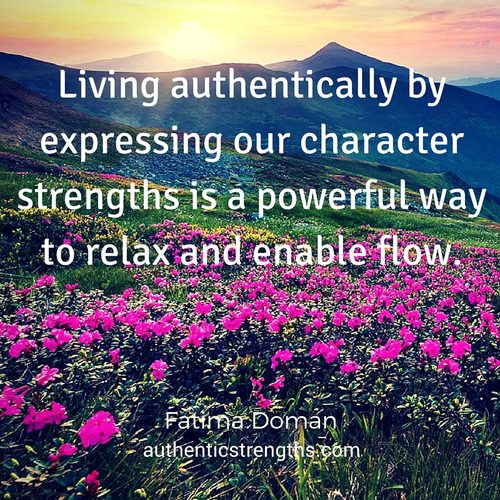When we commit to using our character strengths continuously and in new ways, we engage those strengths in a more authentic and natural expression, which literally increases our capacity to do. This upward spiral produces what is commonly known as “flow”.
When things flow, they are doing what they were made to do — think of a school of fish swimming. When flow is powerful and purposeful, we have optimal energy and full engagement. The resulting fulfillment we experience spills over into other areas of our life. Being in flow with our strengths creates a sense of happiness and wellbeing–we have learned to thrive
Research has shown that character strengths may occupy the most central role in the field of positive psychology, and that flow and other positive experiences are enabled by good character. Exploring the richness of our strengths, empowering our goals with authentic strengths motivation, and engaging our strengths daily produces a remarkable state of flow.
Essential to producing a flow state is learning how to relax enough to let it happen. But true relaxation is rarely achieved passively and must be infused into consistent positive practices. Recent studies have linked deep breathing and meditation with more acute mental focus, freedom from negative judgments, and increased compassion. Why is this so exciting? It is proof that humans can influence their consciousness.
Not only can we influence our consciousness—we can reshape our brains. Research shows that people can develop beneficial centers in the brain while quieting blood flow to areas that produce anxiety, stress, and depression. We can also create habits of positive chemical release by looking at all aspects of our lives through the lens of our character strengths — our work, relationships, and health can be transformed in this way. Living authentically by expressing our character strengths is a powerful way to relax and enable flow.
“Flow — the kind of knowledge or wisdom one needs for emancipating consciousness — is not cumulative. At least as much as intelligence, it requires the commitment of emotions and will. It is not enough to know how to do it; one must do it, consistently, in the same way as athletes and musicians who must keep practicing what they know in theory.” — Dr. Mihaly Csikszentmihalyi

